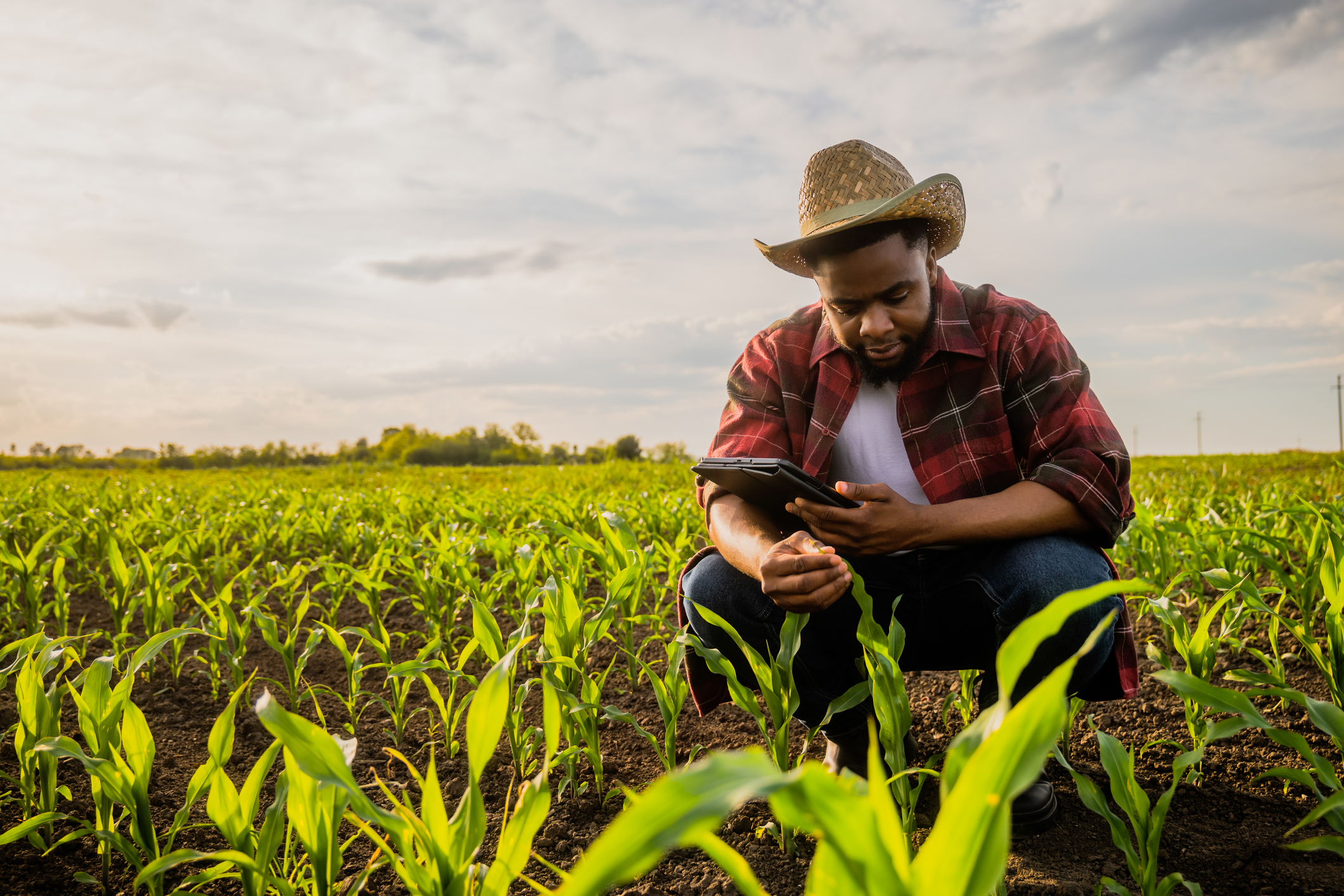Digital Agri-Tech Africa-Brazil Ecosystem Engagement (DATA-BEE) 2024/25
Driving sustainable agriculture through global innovation
Our market-led project empowers farmers and agribusinesses to tackle climate change while maintaining sustainable agricultural productivity. By identifying market gaps and opportunities through online and in-market engagement, we will leverage UK and international farmer networks, alongside partnerships with the UK Department for Business and Trade (DBT) and the Science and Innovation Network (SIN) under the FCDO.
Focusing on Nigeria and Ghana, we aim to address agricultural and technology challenges by connecting solutions that link Brazilian, Nigerian, and Ghanaian agricultural systems. These efforts will support the development of practical business models for local markets, fostering opportunities for collaboration, knowledge exchange, and innovation.
Through close collaboration with farmer organisations and innovation networks, we will prioritise digital agriculture and precision farming interventions. Our work will create pathways for UK businesses and research institutions to contribute to a sustainable, globally connected agricultural future.

What is Digital agriculture and precision farming?
Digital Agriculture and Precision Farming represent advanced agricultural technologies that leverage data, connectivity, and cutting-edge tools to optimise farming practices
Digital Agriculture
Digital agriculture refers to the integration of digital technologies across the entire agricultural value chain.
- Data Collection and Analysis
- IoT Devices
- Satellite Imaging and Remote Sensing
- Big Data Analytics
- Software and Platforms
- Farm Management Information Systems (FMIS)
- Mobile Apps
- Connectivity
- 5G/LoRa Networks
- Cloud Computing
- Blockchain
Precision Farming
Precision farming is a subset of digital agriculture focusing on optimising inputs and outputs on a micro-scale
- GPS and GNSS Technology
- Variable Rate Technology (VRT)
- Sensors and IoT Devices
- Soil Sensors
- Crop Sensors
- Drones and UAVs
- Robotics and Automation
- Precision Irrigation Systems
- Decision Support Systems (DSS)
By accelerating the development, adoption and scaling of technologies and practices that promote climate-smart agriculture the programme will promote sustainable food production systems in Ghana and Nigeria.
Experience, strengths and complementarities between these nations will drive new research, technological demonstration, scale solutions, and support sustainable agriculture and food security. This trilateral partnership pilot will strengthen international connections, opening new routes for the exchange of ideas and new markets for innovative businesses.
The Climate-Smart Agriculture Partnership: UK-Brazil-Africa is funded by the Foreign, Commonwealth and Development Office (FCDO) and delivered by Innovate UK.
As part of the UK Agri-Tech Centre DATA-BEE project our team will be visiting Nigeria and Ghana in February 2025. These webinars will be focused on our learnings from the visits in Nigeria and Ghana featuring keynote speakers supporting and working in the agri sector.
UK /Brazil – Building collaboration in Agri – Tech workshop
This dynamic online workshop brought together agri-tech experts, stakeholders and businesses from the UK and Brazil to explore collaborative opportunities for addressing agricultural challenges in the African market. The event focussed on highlighting innovation in digital farming and precision agriculture in relation to the Climate-smart agriculture partnership project.
- Discover the Digital Agri- Tech Africa – Brazil Ecosystem Management (DATA-BEE) project and explore opportunities to participate.
- Gain insight into Brazil’s agri-tech innovation landscape and its initatives to tackle climate chamnge.
- Deepen your understanding of challenges in African markets and how collaborative efforts between the UK and Brazil can provide impactful solutions.
- Generate ideas and explore potential partnerships for future UK -Brazil projects designed to address opportunities in African markets, including Nigeria and Ghana.
This survey is intended for participants from Africa, specifically those in Ghana and Nigeria. It will be used to collect valuable insights to help uncover key challenges, opportunities, and areas for collaboration in advancing climate-smart agriculture in these two countries. The findings will contribute to a public report and support networking efforts to build partnerships across the UK, Brazil, Ghana, and Nigeria.
What is the climate-smart agriculture partnership?
This pilot programme will build collaborations and enable knowledge sharing between the UK, Brazil and Africa (Ghana and Nigeria) to develop technologies and practices that promote climate-smart agriculture in Ghana and Nigeria.
Climate-smart agriculture is an approach that guides actions to transform food systems towards green and climate resilient practices. It supports reaching internationally agreed goals such as the UN Sustainable Development Goals and the Paris Agreement on Climate Change.
It aims to tackle three main objectives:
- sustainably increasing agricultural productivity and incomes
- adapting and building resilience to climate change
- reducing and/or removing greenhouse gas emissions, where possible (FAO, 2024)
Our participation in this partnership underscores our mission to empower innovators and deliver impactful solutions that address the critical challenges facing global agriculture. By leveraging the expertise within our network, we aim to accelerate the adoption of technologies that will transform farming practices, reduce environmental impact, and support food security in some of the most climate-vulnerable regions.
As the UK’s largest dedicated agri-tech organisation, we are uniquely positioned to foster innovation and drive the development of climate-smart solutions. Our role in the DATA-BEE project will include:
- Facilitating collaboration between stakeholders in the UK, Brazil, Ghana, and Nigeria.
- Promoting the exchange of expertise, technologies, and practices to advance digital agriculture and precision farming.
- Connecting researchers, technologists, and industry leaders to support sustainable and resilient food systems.